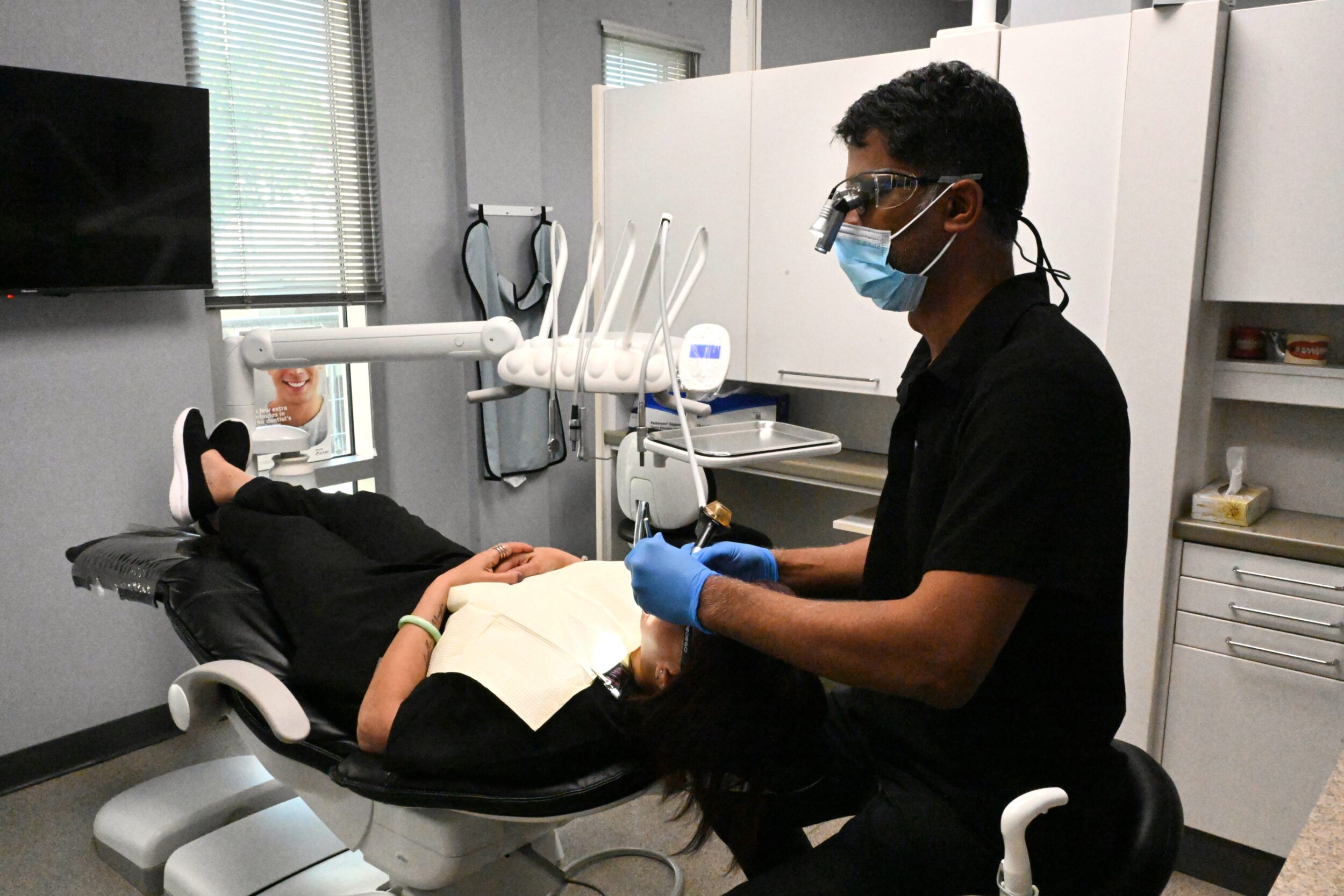After Tooth Extractions in Calgary, AB
A tooth extraction may be recommended by your dentist for a number of reasons. It is not uncommon for some dental patients to suffer from tooth decay, while others require the removal of teeth obstructing orthodontic treatment, while others simply require the removal of wisdom teeth. Despite the fact that tooth extractions are serious dental procedures, aftercare is just as important as the procedure itself. Taking proper care of your dental health can reduce pain and the risk of infection.

The following care should be provided immediately following surgery:
- Avoid smoking for the next 3-4 days if you are a regular tobacco user. Smoking increases the risk of developing a dry socket and infection.
- In order to keep pressure on the gauze pad that your doctor placed over the surgical area, you should gently bite down on it. If the gauze sponge begins to dry out, dampen it with water. Maintain constant pressure for 45-60 minutes, repeating as necessary, or until bleeding subsides. As necessary, change the gauze.
- If possible, keep your head elevated and reduce your activity level.
- Keep your mouth clean by brushing the areas around the surgical site, but avoid brushing the sutures. It is important not to touch the wounded area in any way.
- Place ice packs near the extraction site to control swelling.
- The mouth should be rinsed with warm salt water every two to three hours for the first 48 hours after surgery. Any mouthwash containing alcohol should be avoided since it may irritate the wound.
- Please take all medications as prescribed. Contact the practice or go to the nearest emergency room if any itching or swelling occurs.
- You should eat softer foods, preferably those that are high in protein.
- Drink plenty of fluids during the next 5-7 days, but refrain from drinking through a straw.
It will take some time for your tooth to heal after it has been extracted. Your sutures should fall out or dissolve within three to fourteen days. Your doctor will schedule a follow-up appointment to remove stitches that are not resorbable. Over time, the empty socket of your tooth will gradually fill with bone and smooth out with adjacent tissue.
Complications that may occur after tooth extraction
Bleeding
It is entirely normal to experience bleeding after a tooth extraction. Within the first 36 hours, it is fairly common to experience pinkish-tinged saliva and slight oozing. When bleeding becomes excessive, apply dampened gauze pads to the area and bite down to maintain pressure. Instead of using gauze pads, a moistened tea bag can be used, since tannic acid helps contract blood vessels. By gently biting down on the gauze or tea bag for 30 minutes, apply pressure to the gauze or tea bag. It is important to keep in mind that elevated tempers, sitting upright, and exercise can all increase blood flow to the head, which may result in excessive bleeding. It is advisable to avoid these situations as much as possible. Please contact the practice if your bleeding does not decrease after 48 hours.
Dry socket
The pain associated with your tooth extraction should gradually subside over the following days. Occasionally, patients report that the pain escalates to a throbbing, unbearable sensation that radiates upwards towards the ear. It is often the result of a dry socket. In a dry socket, an irritated blood clot is ejected prior to complete healing. It is then possible for food and debris to enter the socket, causing irritation. Dry socket is more likely to occur in tobacco users and women who take oral contraceptives. It is important to note that dry socket is not an infection, however it does require a visit to our office. Please contact the practice as soon as possible if you suspect that you may be suffering from dry socket.
Bone sequestra (dead tooth fragments)
During surgery, some patients encounter small sharp fragments of teeth that can’t be completely removed. These dead bone fragments, called bone sequestra, gradually work their way through the gums during the healing process. Please contact our practice immediately if you notice any sharp fragments poking through the surgical site prior to the sequestra being removed.
Numbness
After tooth extraction, many patients report feeling numb for several hours. It is normal to lose feeling around the mouth for a period of time following surgery, which may last for ten to twelve hours.
Lightheadedness
It is possible that your blood sugar levels are lower than usual because you may have fasted prior to surgery. When getting up from a relaxed position, you should remember to stand slowly until your body has had the opportunity to catch up and process some sugars. Try eating something soft and sugary, staying relaxed, and reducing your head elevation for some immediate relief.
Swelling
After surgery, swelling should almost completely subside within ten days. In the immediate aftermath of your tooth extraction, apply an ice pack to the facial area near the extraction site. For the first 36 hours, use ice at intervals of 15 minutes. Ice is no longer effective in reducing swelling after 36 hours, so moist heat should be used instead. Apply a warm damp cloth to the sides of your face in order to reduce swelling.
Trismus (difficulty opening and closing mouth)
If you experience a sore jaw and difficulty chewing or swallowing, do not be concerned. It is not uncommon for patients’ chewing muscles and jaw joints to remain sore for 3-5 days following surgery. It may also be difficult for you to open and close your mouth due to this soreness. It is expected that the soreness will eventually subside.
Please contact our practice immediately if you have any concerns or are experiencing any complications not mentioned above.